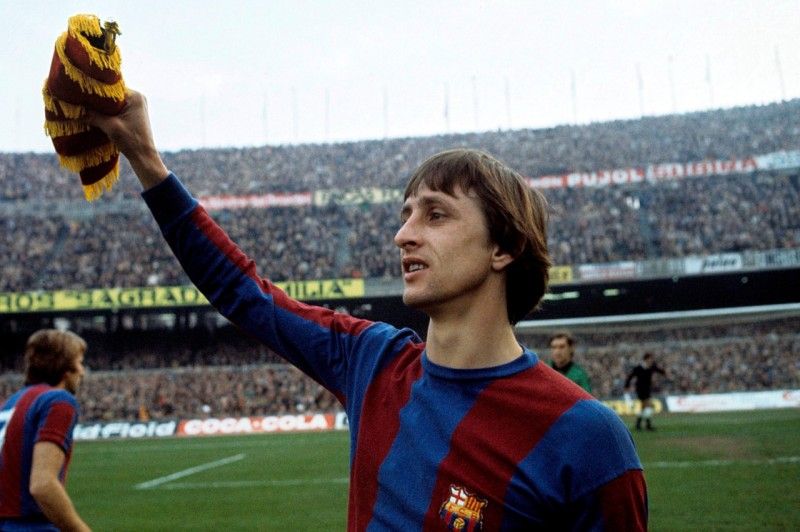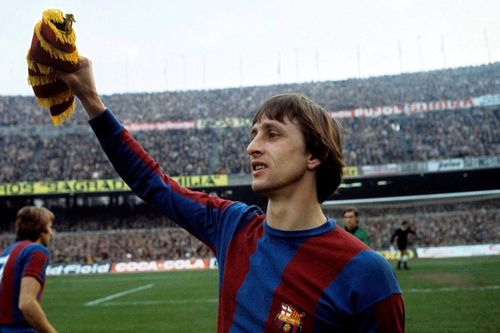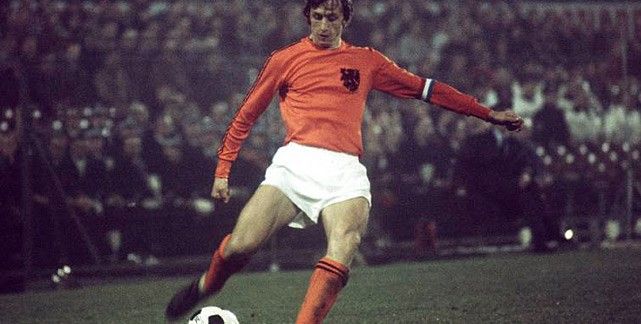
#NoMatterWhat - Johan Cruyff: The man who changed how football was played with his genius

Johan Cruyff is widely regarded as the centre piece of the Dutch 'Total Football' strategy and also thought to be one of the greatest ever players in football history. The Dutchman had a prolific career as a player and continued his success at managerial level.
Cruyff started off his playing career at the age of 10 when he joined the youth division of his local club AFC Ajax in Amsterdam. He made his first team debut at the age of 17 in 1964 and became a regular first-team member in the 1965-66 season.
This was the time when then Ajax manager Rinus Michels had started experimenting with his 'Total Football' strategy. The thought process involved in the strategy was that players rotated around the field not taking a specific position.
This went on to become one of the biggest tactical systems in world football and the multi-talented Cruyff became the system's most famous exponent.
Initially a centre-forward, Cruyff wandered all around the pitch and popped up wherever he could do damage to the opposition. He always had the speed and intelligence to thrive wherever positioned.
After the introduction of 'Total Football', Ajax enjoyed a lot of success winning six Dutch championships, three European cups and two UEFA Super Cups. The success was largely dependent on Cruyff and his abilities as he demanded very high standards from his teammates, which in turn led to Ajax's dominance.
Cruyff attained personal glory thanks to the success of the strategy when he was awarded the first of his three Ballon d'Or awards as the best European player of the year.
In the summer of 1973, FC Barcelona came calling for the “Flying Dutchman” and signed him for a then world record transfer fee of $2 million. His arrival at Barcelona made him a revelation among the supporters and the players of the club.
Cruyff helped Barcelona thrash arch-rivals Real Madrid 5-0 at the Bernabeu, in the process helping them to their first LA Liga title since 1960. This made him a superstar in Spain as thousands of Barcelona supporters who saw the match on TV took to the streets to celebrate the victory.
A New York Times journalist wrote that Cruyff had done more for the spirit of the Catalan people in 90 minutes than many politicians in years of struggle. With Cruyff, the team felt they couldn't lose as he gave them speed of thought, flexibilty and confidence in themselves.
The forward won his second Ballon d'Or midway through his first season with the club in 1973 and added one more to his list the following year.
1974 saw Cruyff win his third Ballon d'Or award and suffer a World Cup final loss to Germany with The Netherlands. He was the top-scorer in the tournament and received the Golden Ball award in his only World Cup with The Netherlands. Altogther, he scored 33 goals in 48 appearances for the Dutch National side.
Cruyff left Barcelona in 1978 having scored 48 goals in 148 appearances for the Catalan giants, winning two trophies in the process. During his time at Barcelona, Cruyff scored one of the most famous goals ever, called 'The Phantom Goal,' against Atletico Madrid in which he leapt in the air, twisted his body and scored while facing away from the goal.
Cruyff's journey took him to the United States of America as well as a return to Spain with second division side Levante. After an injury struck season with Levante, he returned to Ajax and had two successful seasons with his boyhood club.
However, Ajax refused to offer him a new contract in 1984 and he joined rivals Feyenoord in frustration, helping them to their first league title in a decade and a Dutch Cup win. He retired at the end of that season, bringing to an end an illustrious playing career.

After his retirement, Cruyff followed in the footsteps of his mentor Rinus Michels and took the job of manager of Ajax in 1985. Despite lacking formal coaching qualifications, he led the team to two Dutch Cups and a UEFA Cup Winners’ Cup in three years.
His return to Barcelona in 1988 witnessed one of the most successful stretches in world football history as he established a style of football that was both easy on the eye and successful.
Cruyff brought in players such as Pep Guardiola, Ronald Koeman, Michael Laudrup and Romario which helped his 'Dream Team' win four league titles, three Super Cups, a European Cup and a Copa del Rey title.
During this time, Cruyff developed a bad smoking habit and had to undergo double heart bypass surgery which lead to a deterioration of his health. He was fired at the end of the 1996 season after failing to win any significant title over the last two years.
With 11 trophies, Cruyff was Barcelona's most successful manager at that time but was later surpassed by his disciple Pep Guardiola, who won 15 trophies with the club. He returned to the sidelines as manager of the Catalonia national team in 2009 but soon stepped down.
Ajax and FC Barcelona, where Cruyff spent the success years of his career, maintain his footballing philosophy till date. La Masia, Barcelona's youth academy, which has provided a galaxy of stars to the world, was the brainchild of Cruyff.
His managerial ideas and strategies were also adopted by managers like Pep Guardiola and Arsene Wenger and it also helped the Spanish national side's success from 2008 to 2012. Cruyff remains an advisor at Ajax, closely linked to the sport that he once mastered.